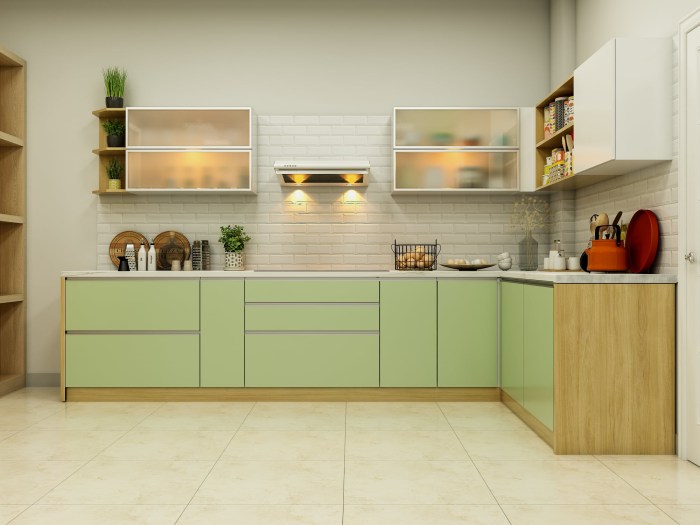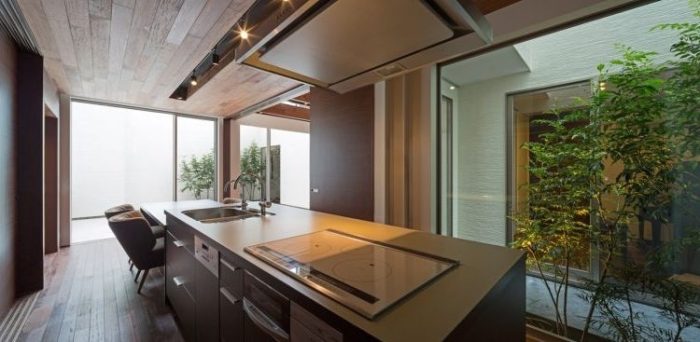Creating a Zen-Inspired Modular Kitchen for Relaxing Cooking – Immerse yourself in the tranquility of a Zen-inspired modular kitchen, where cooking becomes a relaxing and enjoyable experience. This design philosophy embraces simplicity, functionality, and natural elements to create a harmonious and stress-free cooking environment.
Delve into the core principles of Zen design and how they translate into kitchen design, exploring the benefits of modular units for flexibility and customization. Discover the importance of natural materials, soothing colors, and intuitive controls in fostering a relaxing cooking experience.
Zen-Inspired Design Principles
Zen design, originating from Japanese aesthetics, emphasizes simplicity, natural elements, and a sense of tranquility. Applying these principles to kitchen design can create a calming and harmonious space that fosters relaxation while cooking.
Zen-inspired kitchens often incorporate natural materials like wood, stone, and bamboo, which bring warmth and a connection to nature. Simple lines and clean surfaces create a sense of order and serenity. Open spaces and ample natural light promote a feeling of spaciousness and tranquility.
Color Palette
Zen kitchens typically feature a neutral color palette with shades of white, beige, gray, and black. These colors create a calming backdrop that allows the natural elements to take center stage.
Functionality
Zen design emphasizes functionality and efficiency. Kitchens should be well-organized with ample storage space to keep clutter at bay. Appliances should be integrated seamlessly into the design to maintain a clean and uncluttered aesthetic.
Lighting
Natural light is highly valued in Zen design. Large windows and skylights allow ample sunlight to flood the kitchen, creating a bright and airy atmosphere. Artificial lighting should be warm and diffused to avoid harsh shadows and create a relaxing ambiance.
Modular Kitchen Design: Creating A Zen-Inspired Modular Kitchen For Relaxing Cooking

Modular kitchen design is an approach to kitchen planning that involves using pre-fabricated units or modules to create a functional and flexible space. These units can be combined and arranged in various ways to suit the specific needs and preferences of the homeowner.Modular
kitchens offer several advantages over traditional kitchen designs. They are more flexible, allowing for easy customization and reconfiguration of the layout as needed. This is particularly beneficial for those who may want to change the kitchen’s layout in the future or who have specific space constraints.
Modular kitchens are also typically more efficient and ergonomic, as the units are designed to maximize storage and workspace.
Components of a Modular Kitchen
Modular kitchens typically consist of a range of components, including cabinets, drawers, appliances, and countertops. Cabinets come in various sizes and styles, providing ample storage space for cookware, utensils, and other kitchen essentials. Drawers are a convenient option for storing smaller items, such as cutlery and spices.
Appliances, such as ovens, cooktops, and refrigerators, are integrated into the modular units, creating a cohesive and streamlined look. Countertops provide a durable and functional work surface, and they can be made from a variety of materials, such as granite, quartz, or laminate.
Customizing a Modular Kitchen
The beauty of modular kitchens lies in their ability to be customized to meet the unique needs of each homeowner. The units can be arranged in various configurations, allowing for a wide range of layout options. This flexibility makes it possible to create a kitchen that is both functional and aesthetically pleasing.
Homeowners can choose from a variety of cabinet styles, finishes, and hardware to create a kitchen that reflects their personal taste and complements the overall décor of their home.
Relaxing Cooking Environment
Creating a kitchen that fosters relaxation and reduces stress is crucial for enjoyable cooking experiences. Several factors contribute to a serene cooking space, including natural light, ergonomic design, and efficient workflows.
Incorporating ample natural light into the kitchen is essential. Natural light not only brightens the space but also has mood-boosting effects. Large windows, skylights, or glass doors can bring in abundant natural light, creating a more inviting and calming atmosphere.
Ergonomic Design
Ergonomic design principles ensure that the kitchen is comfortable and easy to use. Features like adjustable countertops, pull-out drawers, and comfortable seating reduce physical strain and fatigue. Well-placed storage solutions keep utensils and ingredients within easy reach, minimizing unnecessary movement and stress.
Efficient Workflows
Efficient workflows optimize the kitchen layout for smooth and effortless cooking. A well-planned kitchen triangle between the sink, stove, and refrigerator minimizes unnecessary steps and creates a more efficient workspace. Ample counter space allows for comfortable food preparation, while intuitive controls on appliances make cooking tasks less stressful.
Soothing Colors
Color plays a significant role in creating a relaxing environment. Soft, calming colors like light blues, greens, and neutrals promote tranquility and reduce stress. Avoid overwhelming or overly bright colors that can create a sense of agitation.
Comfortable Seating
Comfortable seating is essential for extended periods of cooking or entertaining. Consider adding a breakfast bar with stools or a cozy corner with a bench or chairs. These seating areas provide a comfortable spot to relax, socialize, or enjoy a meal.
Inspiring Creativity
A well-designed kitchen can inspire creativity and make cooking more enjoyable. Incorporate personal touches, such as artwork, plants, or unique lighting, to create a space that reflects your style and personality. Experiment with different recipes and cooking techniques to keep your culinary experiences fresh and exciting.
Natural Materials and Finishes
In Zen-inspired kitchens, natural materials play a significant role in creating a serene and harmonious atmosphere. Wood, stone, and bamboo are popular choices for their warmth, durability, and connection to nature.
Natural finishes, such as oil or wax, enhance the beauty of these materials while protecting them from wear and tear. These finishes allow the natural grain and texture of the wood or stone to shine through, adding depth and character to the kitchen.
Wood
- Provides a warm and inviting atmosphere.
- Durable and easy to maintain with proper care.
- Can be stained or painted to match any décor.
Stone
- Offers a sleek and sophisticated look.
- Heat-resistant and easy to clean.
- Comes in a variety of colors and patterns.
Bamboo, Creating a Zen-Inspired Modular Kitchen for Relaxing Cooking
- A sustainable and eco-friendly choice.
- Strong and durable, yet lightweight.
- Adds a touch of natural elegance to the kitchen.
Smart Storage and Organization
Designing a modular kitchen layout that maximizes storage and organization is crucial for creating a Zen-inspired cooking space. Smart storage solutions, such as pull-out drawers, corner units, and vertical storage systems, can help you keep your kitchen clutter-free and maintain a sense of order.
Pull-Out Drawers
Pull-out drawers are a great way to maximize storage space in your kitchen. They can be used to store pots, pans, utensils, and other kitchen essentials. Pull-out drawers are also easy to access, making it easy to find what you need when you need it.
Corner Units
Corner units are another great way to maximize storage space in your kitchen. They can be used to store bulky items, such as appliances or cookware. Corner units can also be used to create a more efficient workflow in your kitchen.
Vertical Storage Systems
Vertical storage systems are a great way to maximize storage space in your kitchen without taking up too much floor space. They can be used to store a variety of items, such as spices, utensils, and cookware. Vertical storage systems can also be used to create a more organized and efficient kitchen.
Closure

Creating a Zen-inspired modular kitchen is not merely about aesthetics but about transforming your cooking space into a sanctuary of calm and creativity. By embracing the principles of simplicity, functionality, and natural elements, you can design a kitchen that inspires relaxation, reduces stress, and makes cooking a truly enjoyable experience.
Top FAQs
What are the key principles of Zen design in a kitchen?
Zen design in a kitchen emphasizes simplicity, natural materials, open spaces, and a calming atmosphere.
How do modular kitchen units benefit a Zen-inspired kitchen?
Modular units allow for flexibility and customization, enabling you to create a layout that suits your needs and promotes a relaxing cooking experience.
What natural materials are commonly used in Zen-inspired kitchens?
Wood, stone, and bamboo are popular natural materials that bring warmth and tranquility to a Zen-inspired kitchen.
